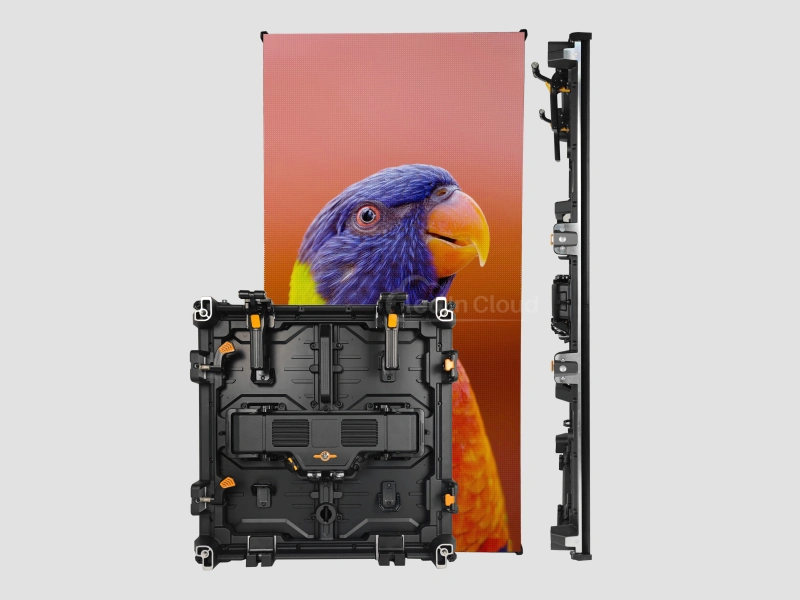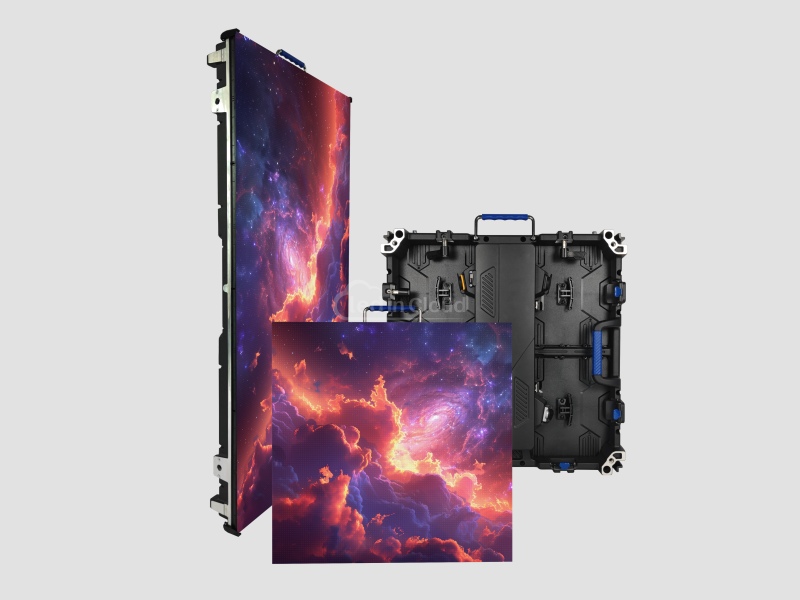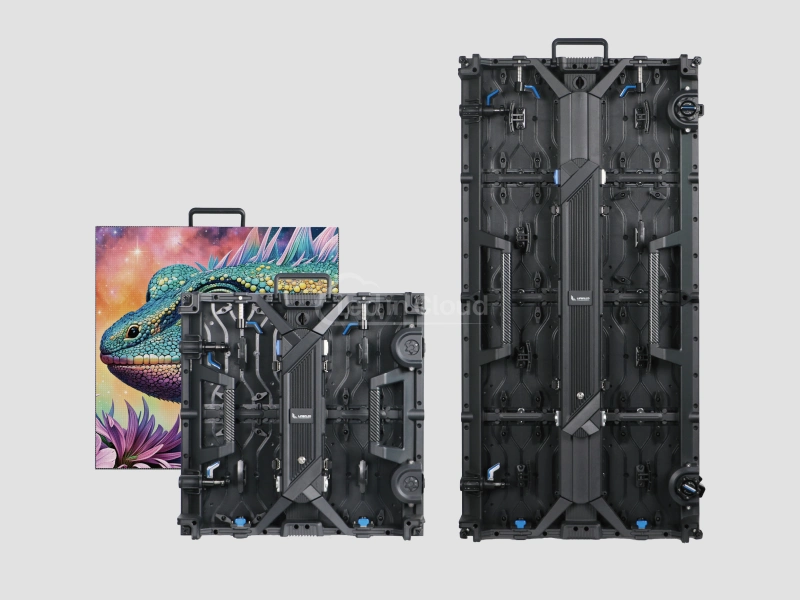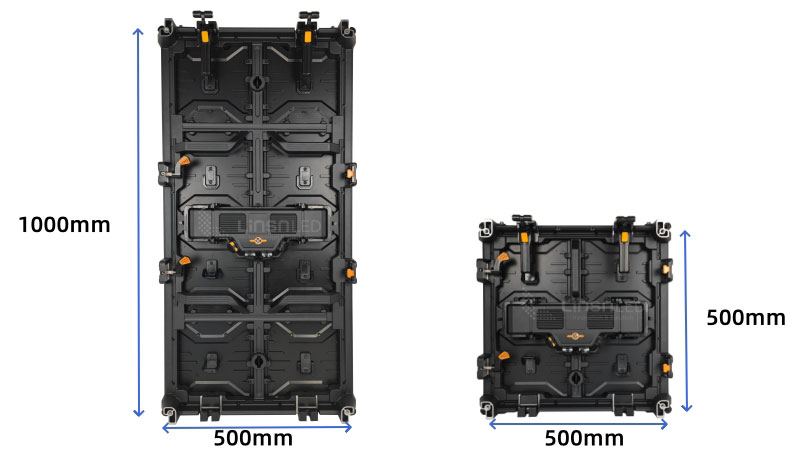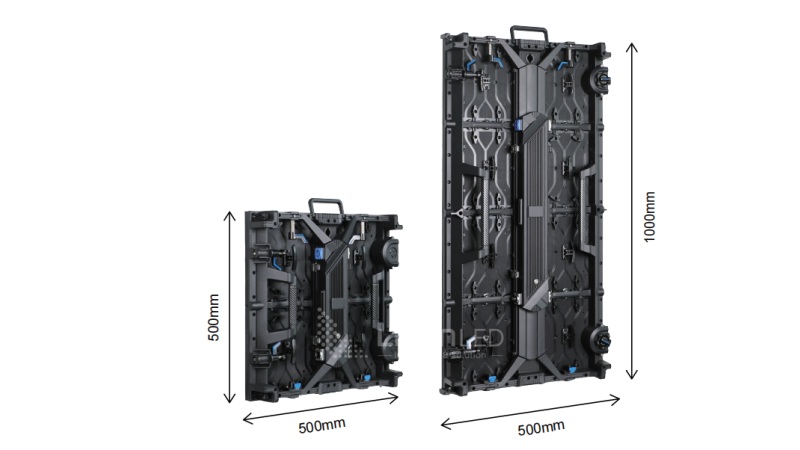
Event LED Screen
Bring unforgettable visuals to any gathering with our advanced Event LED Screens. Whether it’s a music festival, corporate conference, trade show, or wedding celebration, our displays deliver vibrant colors, sharp detail, and reliable performance that captivate audiences. Built for flexibility, these screens adapt to any venue size, layout, and content requirement.
✔ Bright, clear images even in daylight or under stage lights
✔ Modular design for flexible sizes and creative layouts
✔ Reliable performance with low maintenance needs
✔ Perfect for concerts, conferences, exhibitions, and private events
Product Recommendations for Your Events
We design LED screen solutions that match the unique demands of live events. Whether you’re staging a concert, hosting a global summit, or building an immersive exhibition booth, our displays combine flexibility, clarity, and reliability. Explore our most popular rental-ready series below:
LED Display Price Calculator
Just fill the sizes, and get your LED screen budget right now !
LedInCloud Event LED Panel Cases
Real events, real results
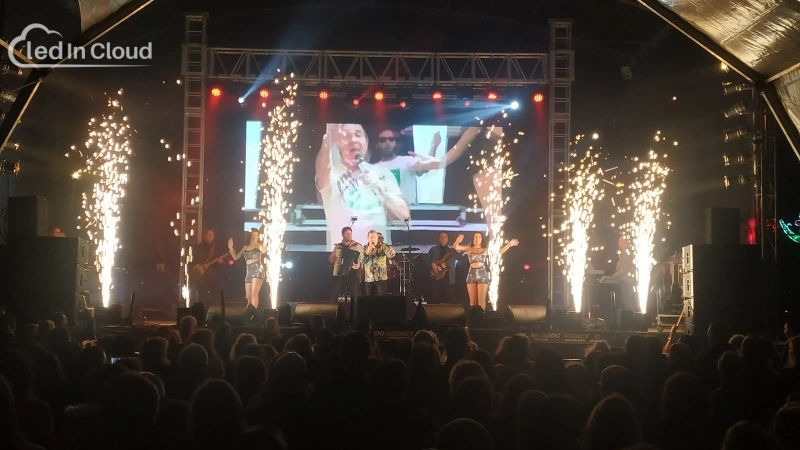
Portugal Project
Installed as a concert backdrop, delivering bright visuals and smooth live video playback.
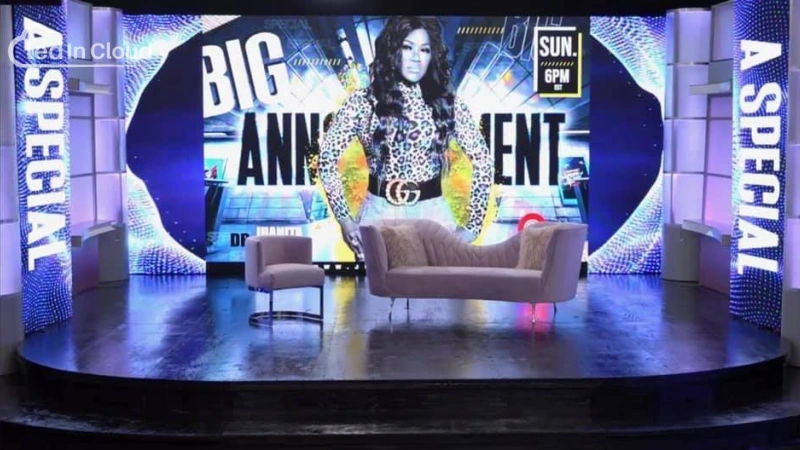
USA Project
Used for a stage program, creating dynamic backgrounds with seamless visuals.
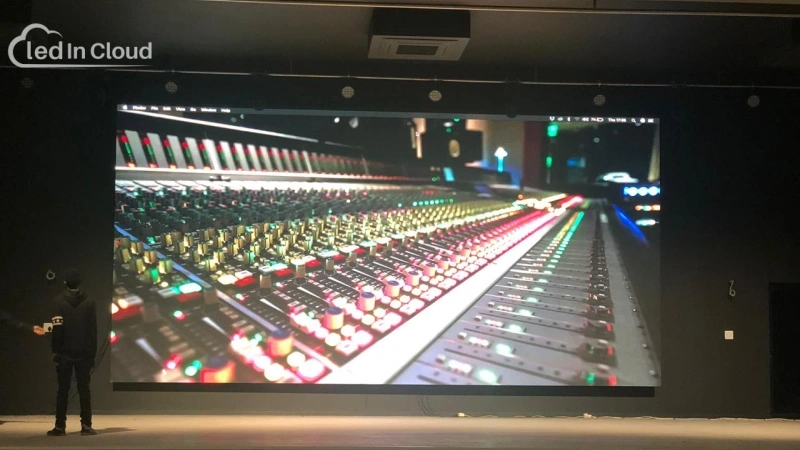
South Africa Project
Set up for a keynote speech, offering clear content display and stable performance.
Applications at a Glance
Where event LED screens make the difference?
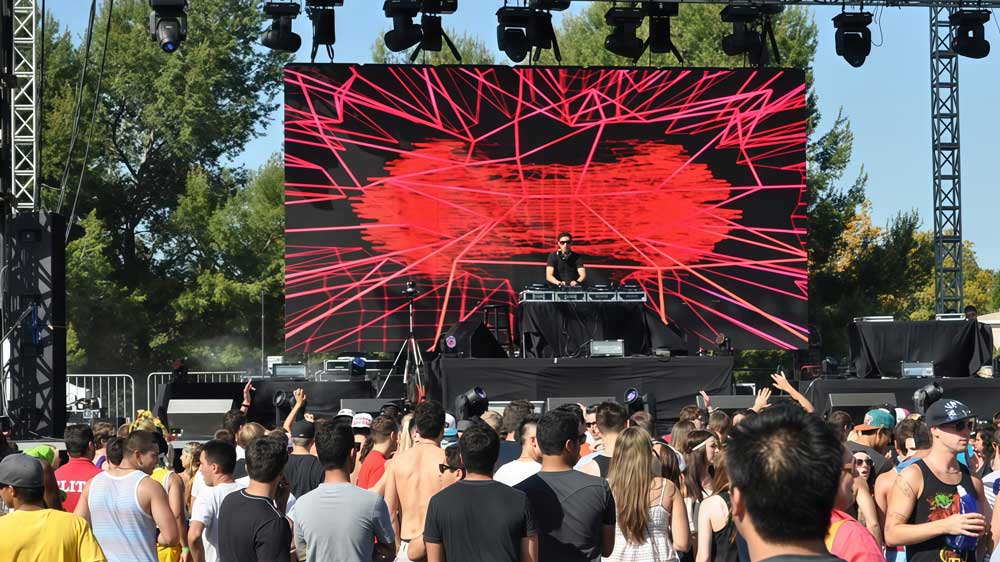
🌞 Outdoor Events
Our LED screens are designed for large gatherings such as concerts, festivals, and sports matches. With high brightness and weatherproof performance, they deliver clear visuals in daylight and under changing conditions. From massive stage backdrops to perimeter boards and side screens, they keep audiences connected and engaged no matter the viewing distance.
🏢 Indoor Events
For conferences, exhibitions, weddings, and private celebrations, our LED displays provide sharp, vivid images that project professionalism and atmosphere. Fine-pitch panels make every detail clear, while flexible setups fit venues of any size — from compact boardrooms to large stages. They create immersive experiences, whether for business presentations or personal milestones.
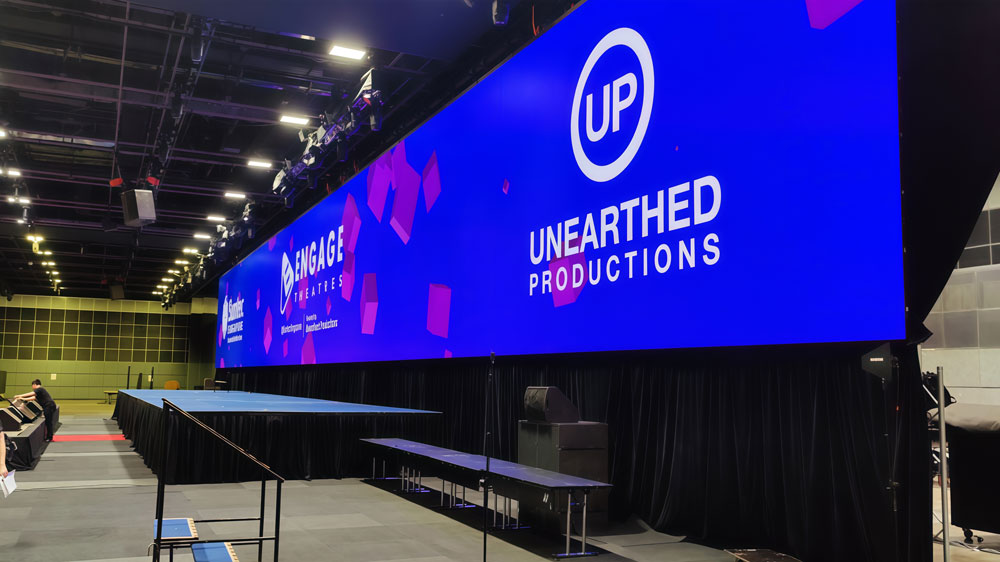
Why Event Organizers Choose Us?
Screens built around your event
Clarity Anywhere
High brightness and deep contrast bring visuals to life indoors or outdoors.
Fast Setup
Lightweight, touring-friendly cabinets reduce build time and labor.
Flexible Plans
Rent for one event, or invest for long-term use.
Creative Layouts
Straight walls, curved edges, even corner builds — we design to fit your vision.
Service & Support
From planning to show time — we’ve got you covered
- Pre-event consultation: screen size, placement, content check
- Remote support during your event
- Fast logistics for rental deliveries
- Spare modules and cables provided for peace of mind
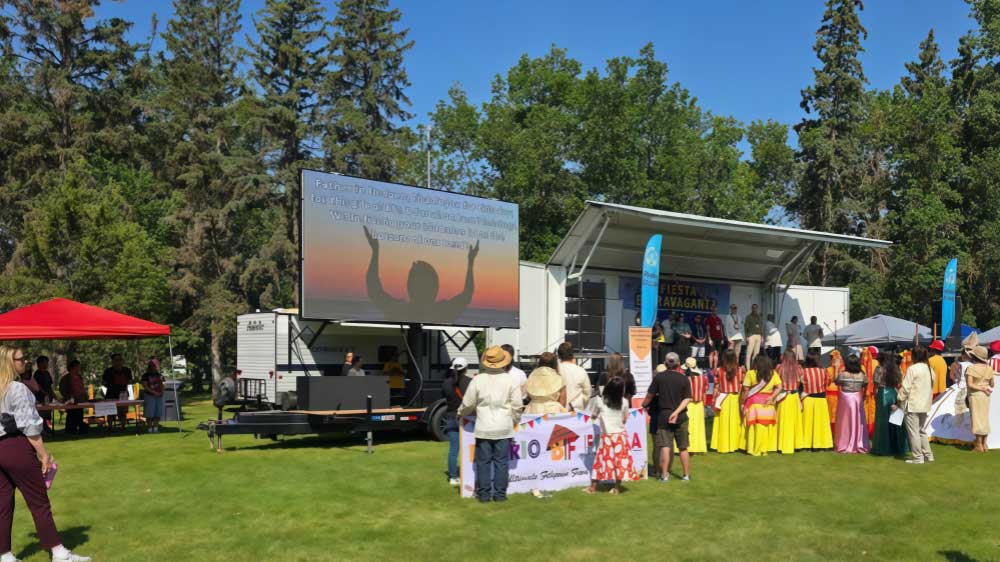
Send Us Message
If you have any LED display projects or technical problems regarding our LED display products. Please send us a message, we will reply to you in 24 hours.
ATTENTION: lf you bought LED Display & LED Module from other suppliers, Please get help from them directly.
Event LED Screen: Perfect Visuals for Stages & Festivals
Event LED screen is now a standard feature at concerts, conferences, weddings, exhibitions, and even sports matches. They don’t just display content—they create atmosphere, keep the audience engaged, and make sponsors more visible.
Still, many people face the same questions: Which type of LED screen is best for my event? Should I rent or buy? And how much will it cost? In this guide, we’ll walk through everything you need to know—from the basics and screen types to rental vs. purchase options, price, and practical tips.
1. What is an Event LED Screen?
An event LED screen is a large display system built with LED panels, applied to present visuals, videos, and live feeds during gatherings such as concerts, weddings, trade shows, festivals, and sports events. Unlike regular TVs or projectors, these screens are modular—made of smaller panels that lock together—so they can be assembled into almost any size or shape.
The technology behind them is based on LED (light-emitting diode) pixels, which produce high brightness and vivid colors. This makes the screen clearly visible even under strong stage lighting or in daylight, something projectors often struggle with.
Because of this flexibility, event organizers use them not only as stage backdrops but also as side screens, entrance displays, scoreboards, or even floor and ceiling installations. In short, an event LED display is a visual centerpiece that helps communicate messages and create atmosphere.
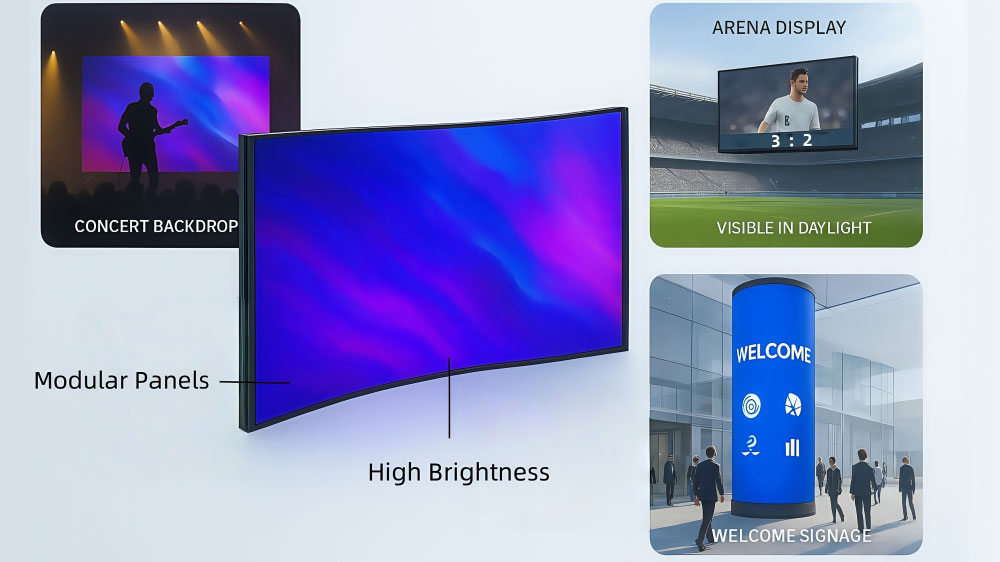
2. Why Use an LED Video Wall for Events?
LED panels for events are more than just big displays—they transform the way attendees experience an event. Here are the main reasons organizers choose LED video walls:
Instant Attention and Visibility
LED screens are bright, colorful, and dynamic. They grab attention immediately, making announcements, schedules, or key visuals visible even in large venues or crowded spaces.
Flexibility in Content
Unlike printed banners or static signage, LED video walls let you change content on the fly. Showcase sponsors, highlight speakers, or switch visuals between presentations, live performances, or product launches without hassle.
Enhanced Stage Presence
Using LED screens as backdrops or side panels can turn a simple stage into a fully immersive environment. Motion graphics, videos, and interactive visuals make performances and speeches more engaging, and ensure everyone in the audience sees the action clearly.
Audience Interaction
LED screens can integrate social media feeds, live polls, or real-time messages from participants, boosting engagement and creating a more interactive experience.
Cost-Effective and Sustainable
Renting or reusing LED screens reduces the need for disposable posters and printed materials. They’re easy to install, adaptable to different venues, and provide high-quality visuals without recurring printing costs.
Professional and Memorable Impact
Beyond functionality, LED screens add a polished, modern look to events. They make the environment visually striking and leave a lasting impression on attendees.
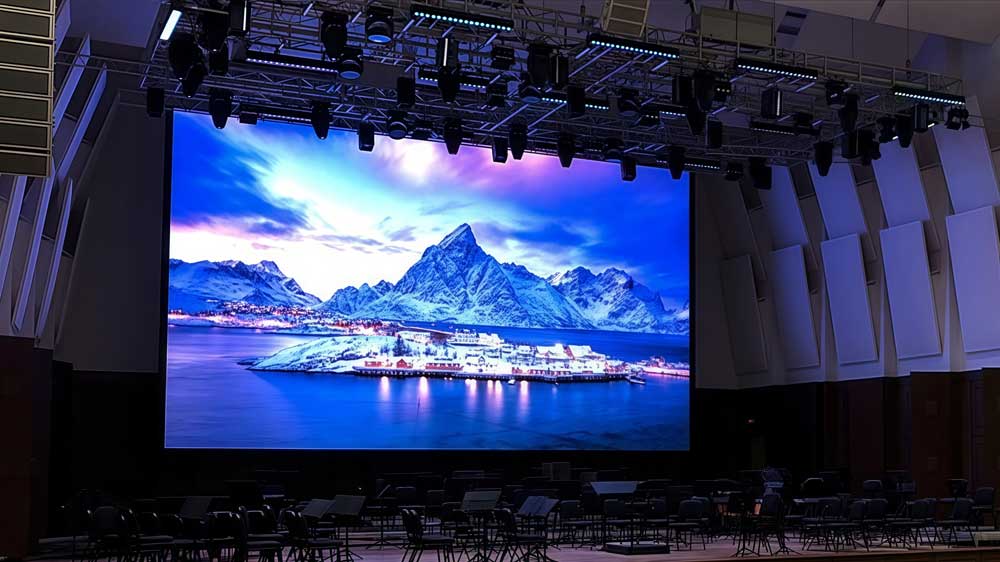
3. Different Types of Event LED Display
Events LED screens are versatile tools that can enhance a wide range of events. Depending on the application, screens can vary in size, resolution, and brightness. Here are the main types by event scenario:
3.1 Concerts LED Screen
LED screens at concerts create immersive visuals for live performances. They can serve as stage backdrops, side panels, or floor displays, showing dynamic video content, live feeds, or light effects. High brightness and vibrant colors ensure every audience member, even at the back, experiences the show clearly.
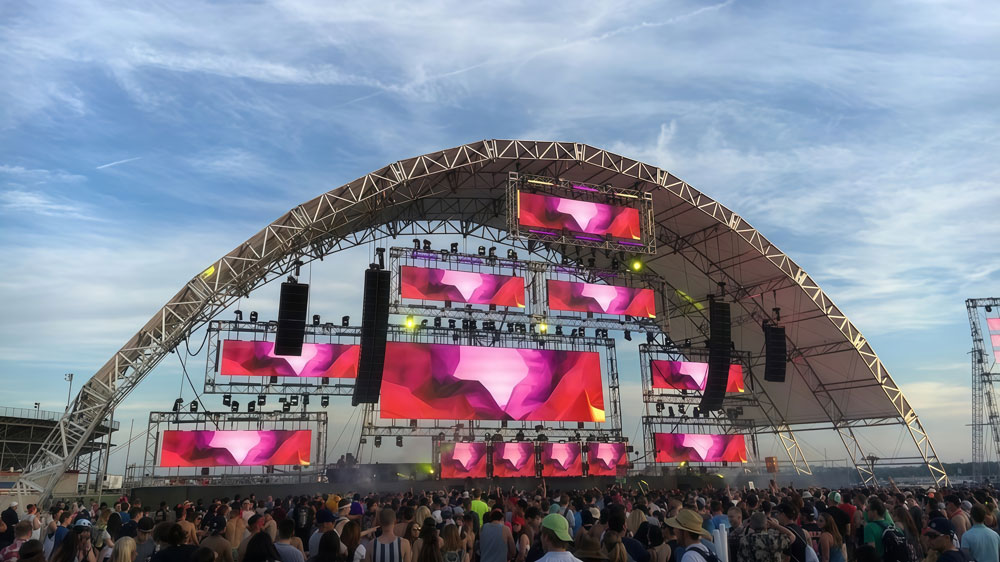
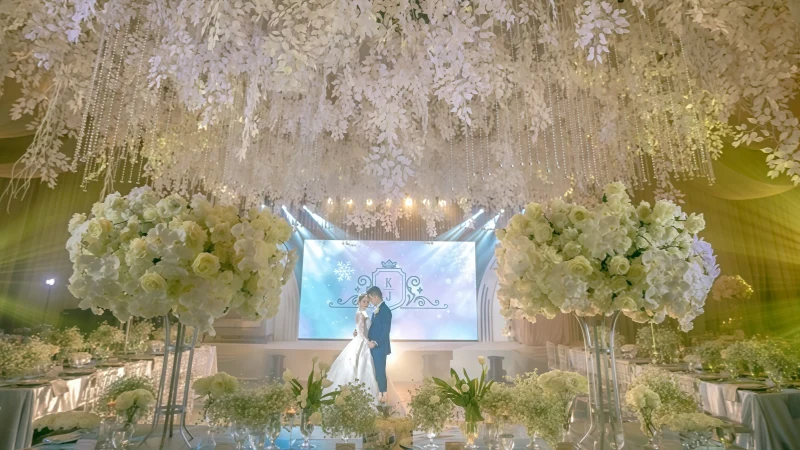
3.2 Wedding LED Screen
Wedding LED screen can display live video feeds, photo slideshows, or custom animations, enhancing the visual experience. Screens can be arranged as a central main screen, side screens, or a combination, matching the venue and event design.
3.3 Conference LED Screen
Conference LED screen displays presentations, agendas, and speaker content. They improve visibility for all attendees and allow seamless integration of live streaming, interactive polls, or social media feeds. Modular screens can fit any conference hall layout.
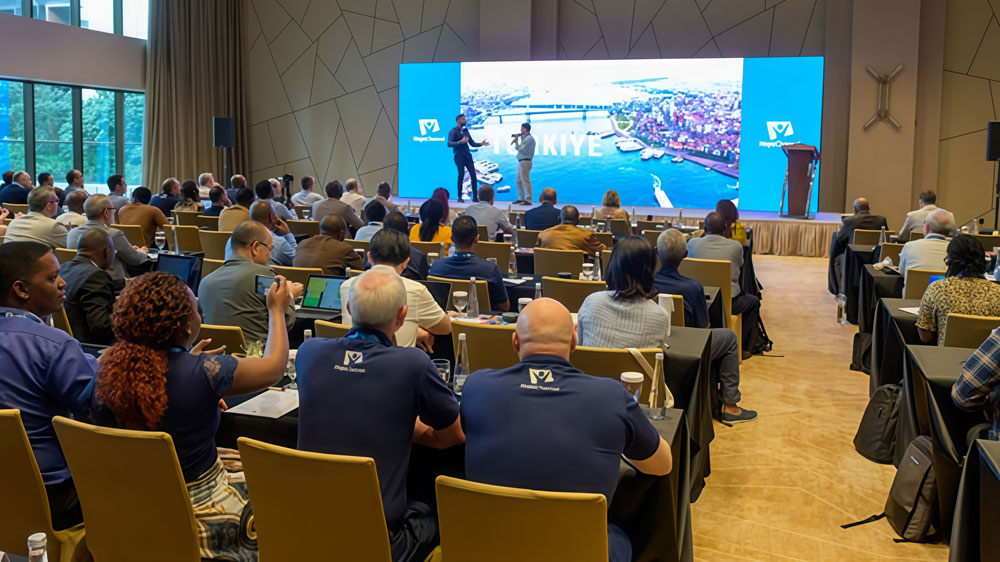
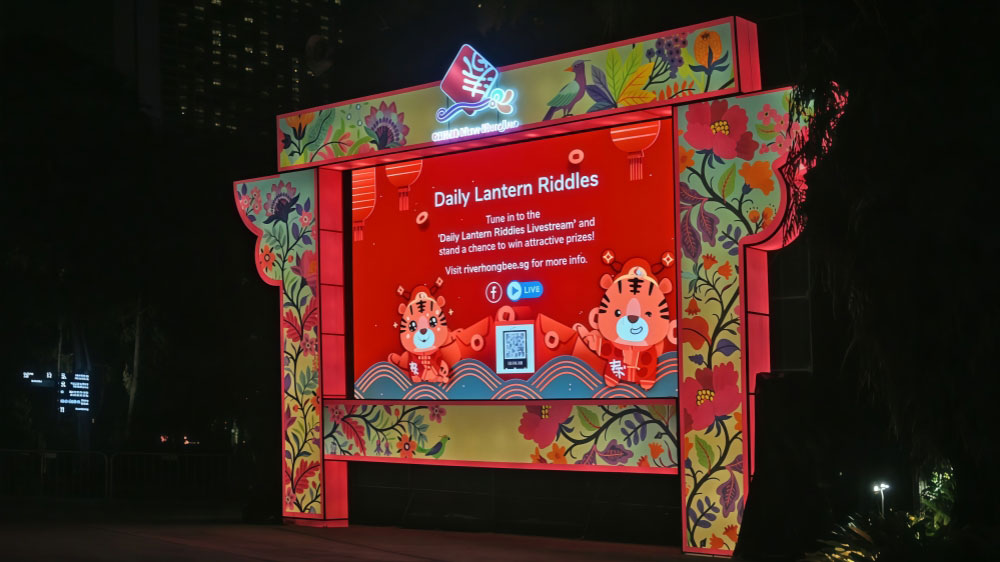
3.4 Festivals LED Screen
For outdoor festivals, LED screens are designed to withstand sunlight and weather while offering high-brightness visuals. They display live performances, schedules, or sponsor content clearly to large crowds from a distance.
3.5 Trade Shows & Exhibitions LED Screen
Exhibition LED displays attract attention to booths, highlight products, or broadcast promotional videos. Flexible placement—hanging displays, floor setups, or modular walls—allows exhibitors to adapt visuals to different booth sizes.

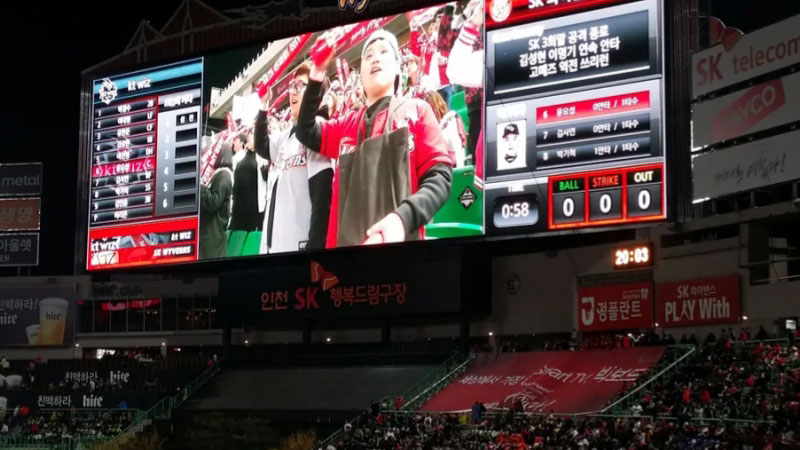
3.6 Sports LED Screen
Sports events benefit from LED screens for scoreboards, perimeter advertising, and replay displays. Screens provide high-resolution visuals and real-time updates, improving the viewing experience for fans throughout the venue.
4. How to Pick the Right One?
Choosing the right LED panel event can feel overwhelming, but if you approach it step by step, it becomes straightforward. Here’s a practical guide from a user perspective:
4.1 Start with Your Event Type
Ask yourself: What kind of event am I hosting?
- Concerts & Festivals: Large audience, need big, bright screens for everyone to see.
- Conferences & Seminars: Smaller crowd, focus on sharp, detailed visuals for closer viewing.
- Product Launches or Exhibitions: Mix of large and medium screens works, emphasize high-definition visuals to showcase products.
4.2 Determine Your Audience Size and Viewing Distance
Think about how far the farthest attendee will be:
- Close range (1 – 6m): Fine pixel pitch (P2 – P3) ensures clear text and images.
- Medium range (6 – 15m): Moderate pixel pitch (P4 – P5) is enough.
- Long range (15m+): Larger pixel pitch (P5 – P10) maintains visibility without unnecessary cost.
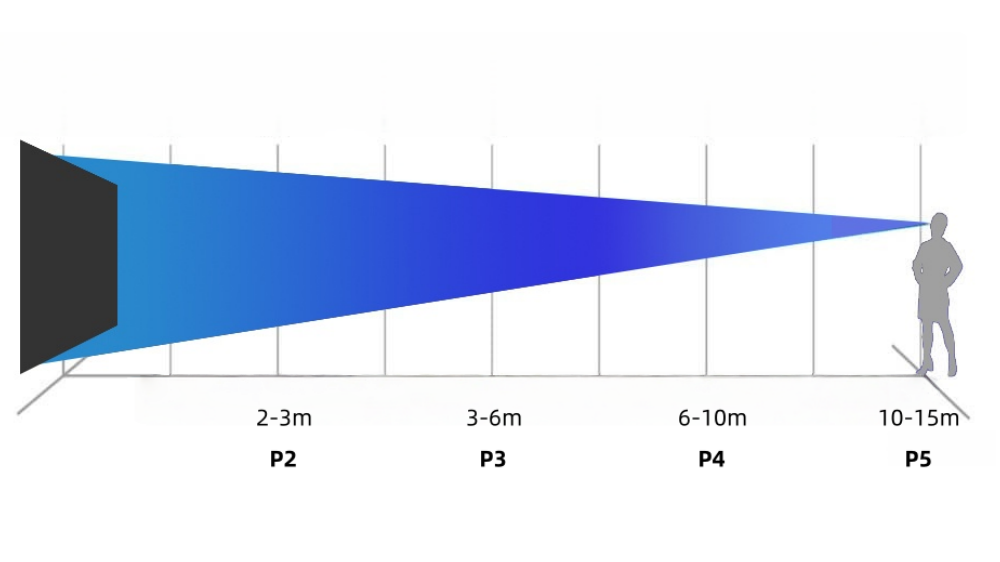
4.3 Indoor or Outdoor Setting?
- Indoor: Controlled lighting, so focus on resolution and color accuracy rather than extreme brightness.
- Outdoor: Sunlight and weather are factors. High brightness (5,000 – 8,000 nits) and weatherproofing are essential.
4.4 Decide on Content Type
What will you show on the screen?
- Static content (logos, text, slides): Moderate resolution is fine.
- Dynamic content (videos, live streams, animations): High resolution and high refresh rate are critical for smooth playback.
4.5 Screen Size and Placement
Measure the venue and consider sightlines.
Use a central main screen for focus, and side or auxiliary screens for wider coverage if needed.
Modular screens allow flexible shapes, curves, or multi-screen layouts.
4.6 Ease of Setup and Support
Choose screens that are easy to assemble, maintain, and operate. If you need technical support during the event, check whether the provider offers on-site or remote assistance.
4.7 Align with Your Budget
Don’t just look at screen price—consider setup, operation, and any extras like controllers or cables.
Make trade-offs between screen size, pixel pitch, and features based on what matters most for your event.
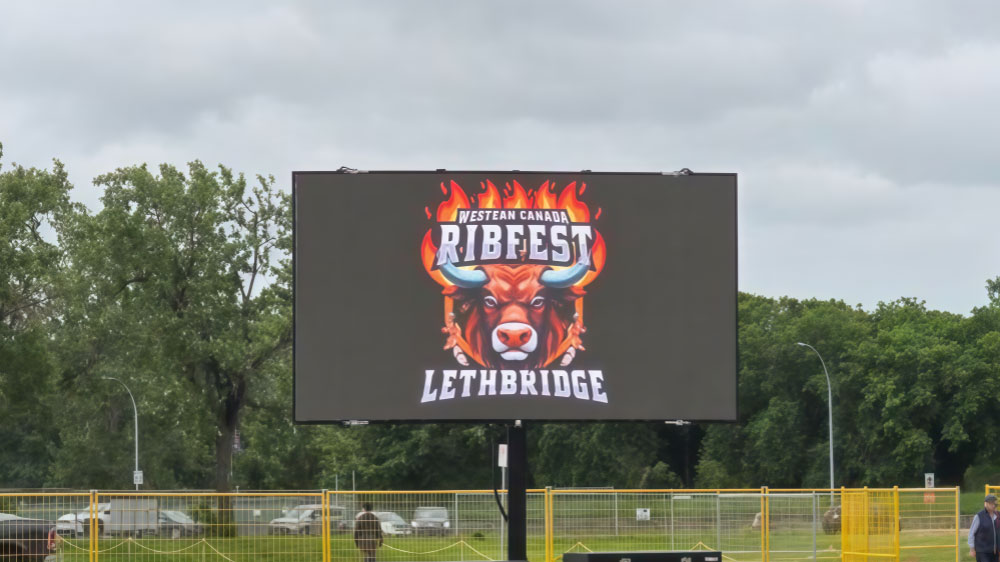
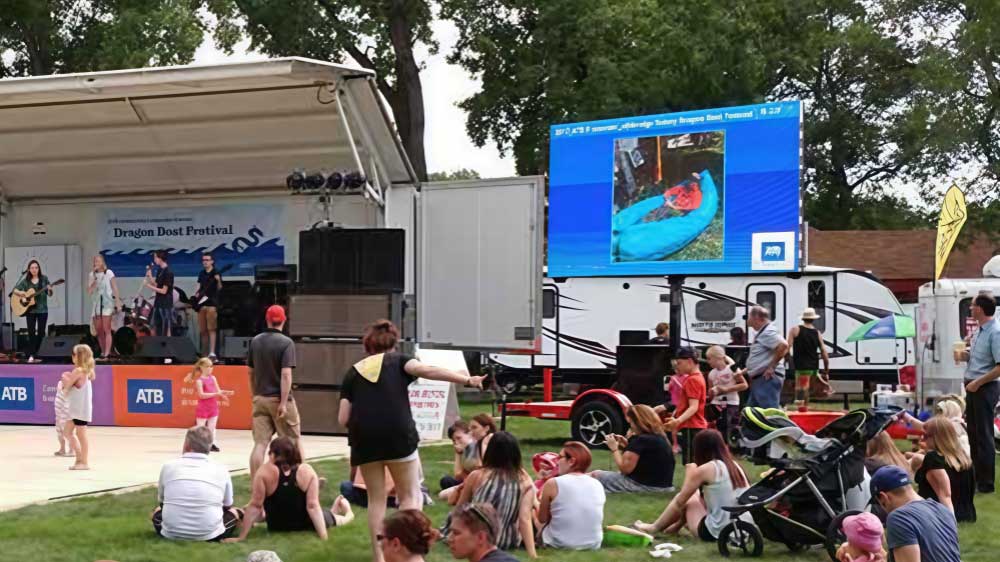
Tip: The right screen balances visibility, content quality, and practical logistics. By following this step-by-step approach, you’ll pick an Event LED screen that fits your venue, audience, and content without unnecessary complexity.
5. Rent or Buy LED Screen for Events
When planning your event, one key decision is whether to rent or buy an LED screen. Here’s a clear comparison:
| Feature | Renting LED Screens | Buying LED Screens |
| Best For | One-time or occasional events | Frequent events or permanent installations |
| Upfront Cost | Low | High |
| Access to Latest Technology | Yes, newest models available | Limited to purchased model |
| Screen Size Flexibility | High – choose per event | Fixed, can customize only at purchase |
| Technical Support | Included | Self-managed, additional cost for support |
| Maintenance | Handled by rental company | Owner responsible |
| Recurring Cost | Rental fee per event | No recurring fees, but potential maintenance costs |
| Customization | Limited | Full control over configuration |
| Best Use Cases | Concerts, conferences, exhibitions, temporary festivals | Event venues, companies with regular events, permanent stage setups |

Summary:
Renting is ideal for most event organizers who need flexibility, professional support, and cost efficiency for occasional or one-off events.
Buying works best for venues or businesses hosting frequent events, requiring full control over screen configuration and willing to invest upfront for a long-term solution.
6. Event LED Screen Price
The cost of an event LED screen depends on several practical factors. Instead of quoting exact numbers, organizers should focus on how each factor affects the budget:
(1) Screen Size
Larger screens require more LED modules, which increases cost.
Consider the venue and audience distance to decide on an appropriate size without overspending.
(2) Pixel Pitch (Resolution & Viewing Distance)
Smaller pixel pitch (higher resolution) costs more.
Choose a pitch that matches the viewing distance—fine for close-up audiences, coarser for distant crowds.
(3) Indoor vs Outdoor Use
Outdoor screens need higher brightness, weatherproofing, and robust frames, which adds to the cost.
Indoor screens generally require less power and simpler frames.
(4) Quality & Maintenance Features
Panels with easy front access or modular designs may cost more but reduce long-term maintenance hassle.
Basic panels are cheaper but can increase downtime if repairs are needed.
(5) Additional Costs
Don’t forget LED controllers, cabling, installation, and transport.
Optional features such as curved displays, interactive functions, or ultra-high refresh rates will also impact the budget.
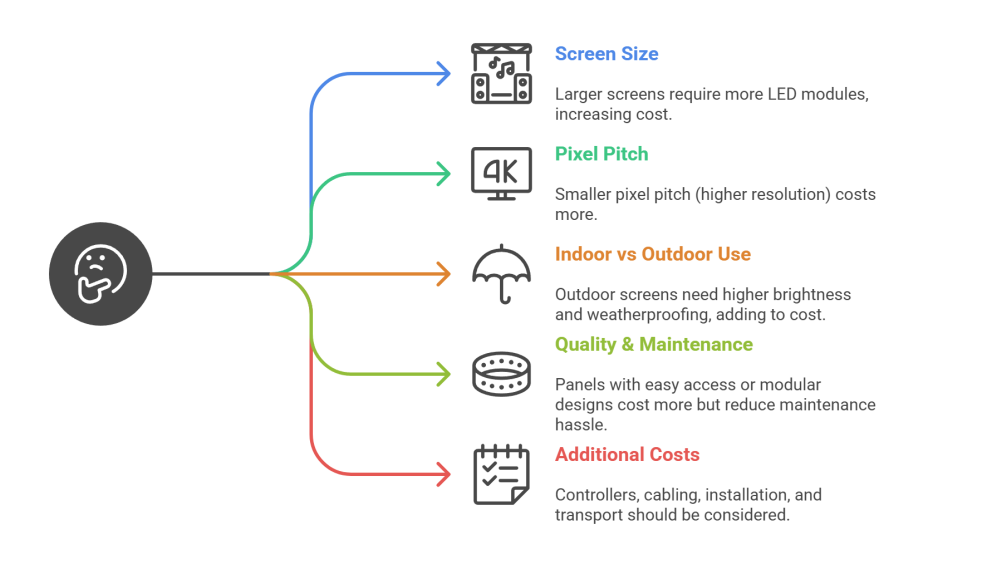
Summary
Instead of focusing on fixed numbers, plan your budget by assessing:
- The size and resolution needed.
- Whether the screen is for indoor or outdoor use.
- Maintenance and additional equipment costs.
This approach ensures you estimate a realistic budget and avoid overspending while getting the right LED screen for your event.
The fastest way to get a tailored quote for your specific event is to register LedInCloud. By signing up, you can access detailed pricing information, see available models, and get personalized recommendations from our experts.
7. Practical Tips
To get the most from your large LED screens for events:
- Choose the Right Size – Make sure everyone in the venue can see clearly. Bigger spaces need bigger screens.
- Adjust Resolution – Smaller pixel pitch for close-up viewing, larger pitch works for distant audiences.
- Prepare Content Early – Use clear images, readable text, and smooth videos. Avoid clutter.
- Mind the Lighting – Outdoor screens need higher brightness. Indoor screens should not overpower the room.
- Position Wisely – Place screens where everyone can see without obstruction.
- Test Before Event – Check visuals, colors, and audio syncing in advance.
- Have a Backup – Keep spare cables or modules ready and staff on hand for troubleshooting.
In short, proper size, placement, content, and brightness make your LED screen more effective and engaging.
8. Recommended Solutions
For event organizers seeking reliable, high-performance LED displays, the LedInCloud MX Series and MY Series rental LED screens are top choices. Both combine durability, clarity, and flexible installation for concerts, conferences, festivals, and other events.
MX Series
- Flexible Cabinet Sizes
- IP65 High Protection
- 3840Hz Refresh Rate, 14-bit Grayscale
- Supports Inner/Outer Curves and U-shaped Setups.
- Dual-input PFC Power with Built-in Safety Switch
- Stack, Hang, or Frame Mount Easily.
MY Series
- Lightweight & Slim
- Front & Rear Maintenance
- Smooth Image Transitions for Immersive Visuals
- Right-Angle & Curved Options
- Safeguards Panels During Handling
- P1.953 - P4.81mm for Various Venues
Both series deliver high-impact visuals, simple installation, and flexible configurations – ideal for creating memorable event experiences.
9. FAQs
(1) How long does it take to set up an LED screen?
Setup time depends on screen size and complexity. Small screens can be installed in a few hours, while large modular walls may take a full day or more, including testing and calibration.
(2) Can LED screens display live video feeds?
Yes. Most modern LED screens support live video streaming from cameras, computers, or media servers, making them ideal for concerts, conferences, and sports events.
(3) How do I maintain the LED screen during an event?
Keep it clean, avoid obstructing ventilation, and ensure stable power supply. LedInCloud LED screen products offer front-service maintenance, allowing technicians to fix minor issues without dismantling the entire display.
(4) Can LED screens improve audience engagement?
Absolutely. LED screens can show dynamic visuals, interactive content, and live social media feeds, creating a more immersive and engaging experience for attendees.
10. Conclusion
Event LED screens are more than just a display – they’re a powerful tool to elevate any event. From concerts and conferences to product launches and outdoor festivals, the right LED screen can transform the audience experience, enhance engagement, and provide dynamic visual impact. Choosing the right screen involves understanding your event’s size, location, content, and audience, while also weighing options like renting versus buying.
For precise pricing, tailored recommendations, and expert support, registering on our LED Screen Cloud Platform gives you direct access to the latest LED screen solutions and professional guidance. With the right LED display, your event won’t just be seen – it will be remembered.
More Solutions
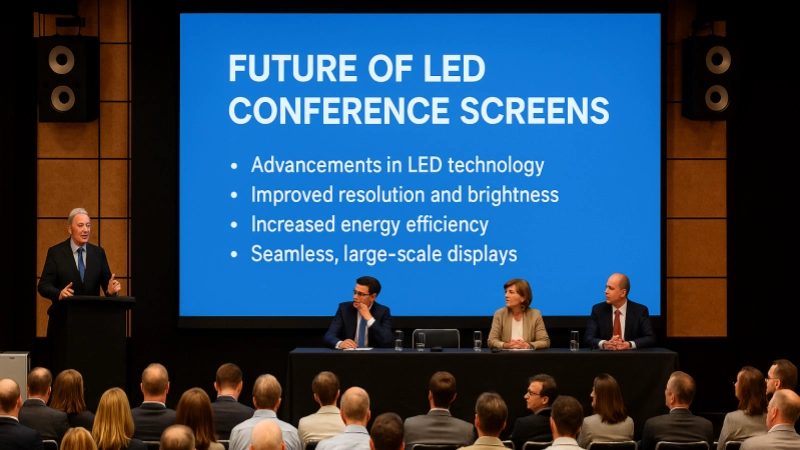
Conference LED Screen
High-resolution display for meetings, events, and presentations with clear visuals and easy setup.
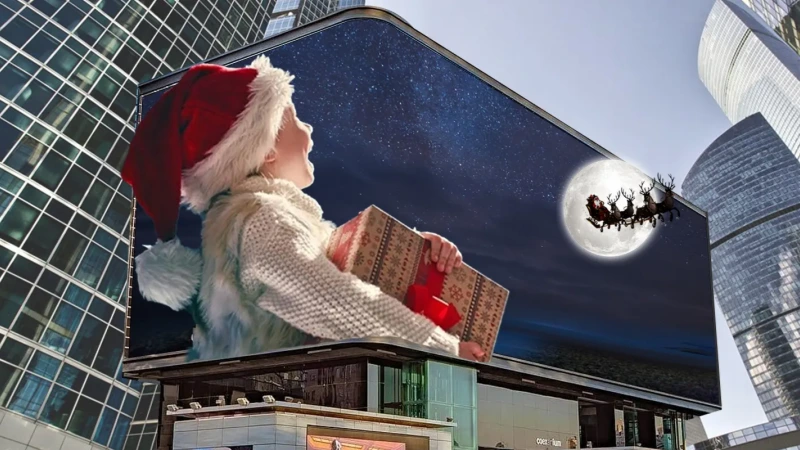
3D LED Screen
Eye-catching naked-eye 3D visuals that attract crowds and boost brand exposure in outdoor spaces.

Stage LED Screen
Dynamic visuals for concerts, events, and live shows, offering vivid effects and seamless synchronization.
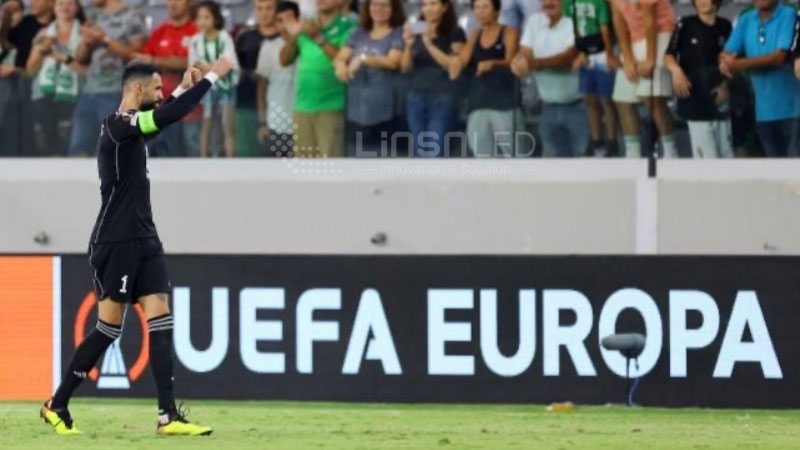
Sports Stadium LED Screen
It shows live games, replays, scores, ads, and messages, helping fans see the action clearly from any seat.

